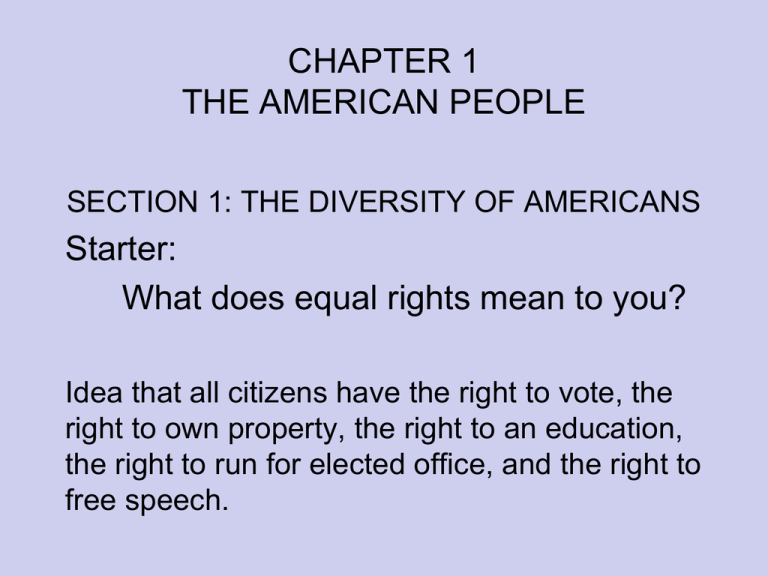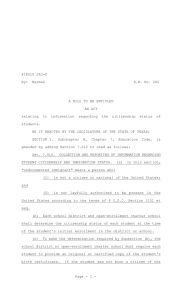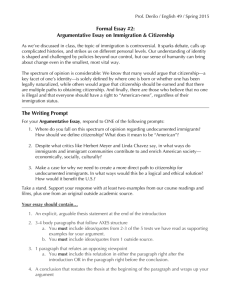Chapter 1 and 5 Citizenship - Public Schools of Robeson County
advertisement

CHAPTER 1 THE AMERICAN PEOPLE SECTION 1: THE DIVERSITY OF AMERICANS Starter: What does equal rights mean to you? Idea that all citizens have the right to vote, the right to own property, the right to an education, the right to run for elected office, and the right to free speech. What is Civics? • Study of right & duties of citizens • History: dates back 2500 years – Ancient Greece & Rome – Only men with property: right to vote and take part in government • Today citizenship not defined by race, property, gender, etc. • Why do you think women were not given rights as citizens? – They were considered inferior, uneducated, and uninformed, or viewed as property. E PLURIBUS UNUM • Out of Many, One • Diversity of Americans coming together to make a single strong nation • Melting Pot Theory • More than 300 million people live in the US MANY TRADITIONS • What do you think this political cartoon represent? • Different immigrants entering the US • SALAD BOWL THEORY A NATION OF IMMIGRANTS • First immigrants • Perhaps were Native Americans • Traveled by way of Beringia or the present day Bering Straight Nation of Immigrants • Spanish • 1500’s • Lived in what is now Florida, California, and the Southwest • Before U.S. gain independence from England they also lived in Tucson, Albuquerque, San Antonio, San Diego Early Immigration • 1600’s • Came from France and England • French – Canada & Mississippi River • English immigrants • East coast • 13 Colonies Early Immigration • Late 1600’s & 1700’s – – – – – Germans Netherlands Ireland Scotland Sweden • Joined the English settlers along the East Coast After Independence • United States gain independence from England • Europeans 1860’s to 1890 more than 10 million • DENMARK • SWEDEN • NORWAY A Shift in Immigration • 1890’s and 1924 • 22 million immigrants • Southern and Eastern Europeans – Italy, Greece, Norway, Sweden FORCED IMMIGRATION • 1618 to1808 • Western and Central Africans • Taken from homes, shipped across Atlantic, and sold as slaves in Caribbean Islands – In North and South America • In 1808 became illegal • More than 500,000 into the country. Transforming America: Shifting Population • 1830-1930 120 million Immigrants • 1850’s Rural to Cities – Agri/Farming to Factory Jobs – Today Factory to Service Industry • Blue-collar workers • Factory workers • White-collar workers • Offices, schools, stores, and other nonfactory • 1980S-1990’s City to Suburbs AMERICAN VALUES AND INSTITUTIONS AMERICAN VALUES • BASIC AMERICAN VALUES SHARED BY MOST AMERICAN CITIZENS – FREEDOM, EQUALITY, JUSTICE, OPPORTUNITY, DEMOCRACY, UNITY, RESPECT & TOLERANCE • SHARED VALUES - FOUND IN FOUNDING DOCUMENTS – DECLARATION, US CONSTITUTION, BILL OF RIGHTS – “LIFE, LIBERTY, AND THE PURSUIT OF HAPPINESS” – POPULAR SOVEREIGNTY-GOVERNMENT BY CONSENT OF THE GOVERNED—EQUAL JUSTICE UNDER LAW, MAJORITY RULE THROUGH PEOPLE’S REPRESENTATIVES IN GOV’T American Institutions • IDEAS ABOUT RELATIONSHIPS, OBLIGATIONS, ROLES, FUNCTIONS – Family: Core of Social Life – Religion: Churches, Temples – Education: Society’s culture, History, Learning, Identity, Personal growth – Social Institutions: Clubs and Volunteer Service – Government: Different Parts BELL STATER • WHAT DOES E PLURIBUS UNUM STAND FOR? • NAME THE THREE MOST IMPORTANT DOCUMENTS FOR THE UNITED STATES? • DO NOT USE YOUR NOTES OR BOOK Chapter1 Section 2 WHO ARE AMERICAN CITIZENS? 14th Amendment defines citizen as anyone born or naturalized Citizenship by Birth • BORN IN – 50 States, DC, and territory like Puerto Rico, Guam, & US Military bases • BORN SOMEWHERE ELSE – Both Parents Citizens – One Parent Citizen & Lived in US • DUAL CITIZENSHIP – Holds US and other citizenship NATURALIZATION PROCESS • Immigrants- people who move permanently to new country to gain citizenship • Declaration of Intention (INS) • Interview • Citizenship Test • Oath of Allegiance • Citizenship gained over the years – 3 to 5 year process CITIZENSHIP LIFELONG PRIVILEGE • Most Americans keep citizenship forever • State can deny convicted criminal of some privileges – voting • Federal government can strip citizenship if it’s gain illegally • 3 ways to lose citizenship – DENATURALIZATION • Through fraud naturalization – EXPATRIATION • Giving up citizenship by leaving one’s country – PUNISHMENT • Crimes such as treason, participation in a rebellion and attempt to overthrow government through violent means. Chapter 1 Section 3 Government & the People What is government? Ruling authority for a community or society. What services does our government provide? • PROVIDE LAWS OR RULE OF CONDUCT • KEEP ORDER • PROVIDE SECURITY • PROVIDE PUBLIC SERVICES • GUIDE COMMUNITY LEVELS OF GOVERNMENT • NATIONAL – 1 • STATE – 50 • LOCAL – 1000S – COUNTY, CITY, TOWN, TOWNSHIP, VILLAGE TYPES OF GOVERMENTS FORMS OF GOVERNMENT CROSSWORD ACTIVITY • DEMOCRATIC – PEOPLE RULE THROUGH FAIR, FREE ELECTIONS • DIRECT DEMOCRACY – citizens met debate government matters and vote first-hand • Representative Democracy – Smaller group to representative, make laws, and govern on citizens behalf • REPUBLIC – Limited government; people are the ultimate source of government • Constitutional Monarchy – Kings or Queens • MAJORITY RULES • AUTHORITARIAN – RULERS RULE W/O CONCERN FOR PEOPLE • DICTATORISHIPS – complete control over stateCuba, Iraq • TOTALITARIAN REGIMES – government control almost all aspects of one’s life—China and North Korea • ABSOLUTE MONARCHY – unlimited authority-Middle East – CONTROL ALL ASPECTS OF LIFE Chapter 5 Section 1 Citizenship & Government in a Democracy Duties vs. Responsibilities WHAT’S THE DIFFERENCE? WHAT’S THE DIFFERENCE? DUTIES RESPONSIBILITIES • OBEY THE LAWS • BE INFORMED • SPEAK UP & VOTE • RESPECT RIGHTS OF OTHERS – Most important • PAY TAXES • DEFEND THE NATION – Military Services • SERVE IN COURT • ATTEND SCHOOL – TOLERANCE • CONTRIBUTE TO THE COMMON GOOD – VOLUNTEERISM IDENTIFY THE FOLLOWING GOVERNMENTS AS LOCAL, STATE OR NATIONAL Local, State, or National Local, State, or National Local, State, or National Local, State, or National Local, State, or National What are Communities? • Is a group of people who share ideals and values in a particular area • To make the communities safe & successful it must make good Public Policy. • To make the community safe & successful we must fulfill certain obligations: • DUITES • RESPONSBILITIES CHAPTER 5 SECTION 2 CITIZENS AND THE COMMUNITY CITIZEN INVOLVEMENT WHY DO WE NEED CITIZENS TO BECOME INVOLVED? • TWO VERY GOOD REASONS – SCARCITY • Not have enough resources (welfare) – BUREAUCRACY • Government complex system with many departments HOW DO WE BECOME INVOLVED? • PARTICIPATING IN OUR GOVERNMENT • VOLUNTEERING OUR TIME AND MONEY VOLUNTEERING IN ACTION IN THE USA NATIONAL SERVICE PROGRAMS NATIONAL SERVICE PROGRAMS




